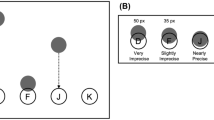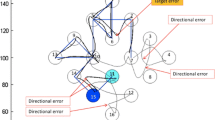Abstract
Objectives
Even though individuals who have DCD may have difficulties learning a motor skill, few studies have investigated the mechanisms involved. Understanding these mechanisms and whether individuals with DCD show selective deficits would be of theoretical and practical interest. This study examined implicit motor sequence learning in adults with and without DCD using a serial response time (SRT) task.
Methods
Eleven participants with DCD (according to the DSM-5 criteria) and 18 participants without DCD matched for age, gender and handedness completed a version of the serial response time (SRT) task. Following this, a free generation task (FGT) assessed explicit sequence knowledge.
Results
Both groups were able to complete the SRT task and showed comparable accuracy. A Condition x Block interaction for response time (RT) data during the learning phase was explained by a failure of the DCD group to improve their performance, while the control group showed the typical learning effect of gradually faster RTs. Responses on the FGT revealed that the DCD group also acquired significantly less sequence knowledge than the control group during the task. Controlling for the development of sequence knowledge across the two groups still revealed an implicit learning deficit in the DCD group.
Conclusions
Adults with DCD failed to demonstrate the typical signs of implicit (procedural) learning on an established and influential sequence learning task. In addition, difficulties in acquiring task-related knowledge may point towards multiple difficulties in learning motor skills.




Similar content being viewed by others
References
American Psychiatric Association. (2013). Diagnostic and statistical manual of mental disorders (5th ed.). American Psychiatric Association.
Barnett, A. L., Hill, E. L., Kirby, A., & Sugden, D. A. (2015). Adaptation and extension of the European recommendations (EACD) on developmental coordination disorder (DCD) for the UK context. Physical and Occupational Therapy in Pediatrics, 35(2), 103–115. https://doi.org/10.3109/01942638.2014.957430
Bilker, W. B., Hansen, J. A., Brensinger, C. M., Richard, J., Raquel, E., Gur, R. E., & Gur, R. C. (2012). Development of abbreviated nine-item forms of the raven’s standard progressive matrices test. Assessment, 19(3), 354–369. https://doi.org/10.1177/1073191112446655
Bird, G., Osman, M., Saggerson, A., & Heyes, C. (2005). Sequence learning by action, observation and action observation. British Journal of Psychology, 96, 371–388. https://doi.org/10.1348/000712605X47440
Blais, M., Jucia, M., Maziero, S., Albaret, J.-M., Chaix, Y., & Tallet, J. (2021). Specific cues can improve procedural learning and retention in developmental coordination disorder and/or developmental dyslexia. Frontiers in Human Neuroscience, 15, 1–12. https://doi.org/10.3389/fnhum.2021.744562
Blank, R., Barnett, A. L., Cairney, J., Green, D., Kirby, A., Polatajko, H., Rosenblum, S., Smits-Engelsman, B., Sugden, D., Wilson, P., & Vincon, S. (2019). International clinical practice recommendations on the definition, diagnosis, assessment, intervention, and psychosocial aspects of developmental coordination disorder. Developmental Medicine and Child Neurology, 61(3), 242–285. https://doi.org/10.1111/dmcn.14132
Boyd, L. A., & Winstein, C. J. (2003). Impact of explicit information on implicit motor-sequence learning following middle cerebral artery stroke. Physical Therapy, 83, 976–989. https://doi.org/10.1093/ptj/83.11.976
Bruininks, B. D., & Bruininks, R. H. (2005). Bruininks-Oseretsky test of motor proficiency (BOT-2, Brief Form) (2nd ed.). Pearson.
Cleaton, M. A. M., & Kirby, A. (2018). Why do we find it so hard to calculate the burden of neurodevelopmental disorders? Journal of Childhood & Developmental Disorders, 4(3), 1–20. https://doi.org/10.4172/2472-1786.100073
Cousins, M., & Smyth, M. M. (2003). Developmental coordination impairments in adulthood. Human Movement Science, 22, 433–459. https://doi.org/10.1016/j.humov.2003.09.003
Destrebecqz, A., & Cleermans, A. (2001). Can sequence learning be implicit? New evidence with the process dissociation procedure. Psychonomic Bulletin and Review, 8, 43–350. https://doi.org/10.3758/BF03196171
Gheysen, F., Van Waelvelde, H., & Fias, W. (2011). Impaired visuo-motor sequence learning in developmental coordination disorder. Research in Developmental Disabilities, 32, 749–756. https://doi.org/10.1016/j.ridd.2010.11.005
Hands, B., Licari, M., & Piek, J. (2015). A review of five tests to identify motor coordination difficulties in young adults. Research in Developmental Disabilities, 41–42, 40–51. https://doi.org/10.1016/j.ridd.2015.05.009
Hyde, C., Ian, F., Peter, E. G., Derek, J. K., Shawna, F., Tim, S. J., et al. (2019). White matter organization in developmental coordination disorder: A pilot study exploring the added value of constrained spherical deconvolution. Neuroimage Clinical., 21, 101625. https://doi.org/10.1016/j.nicl.2018.101625
Hill, E. L., & Brown, D. (2013). Mood impairments in adults previously diagnosed with developmental coordination disorder. Journal of Mental Health, 22(4), 334–340. https://doi.org/10.3109/09638237.2012.745187
Jacoby, L. L., Toth, J. P., & Yonelinas, A. P. (1993). Separating conscious and unconscious influences of memory: Measuring recollection. Journal of Experimental Psychology: General, 122, 139–154. https://doi.org/10.1037/0096-3445.122.2.139
Kirby, A., Edwards, L., Sugden, D., & Rosenblum, S. (2010). The development and standardization of the adult developmental co-ordination disorders/dyspraxia checklist (ADC). Research in Developmental Disabilities, 31, 131–139. https://doi.org/10.1016/j.ridd.2009.08.010
Lingam, R., Hunt, L., Golding, J., Jongmans, M., & Emond, A. (2009). Prevalence of developmental coordination disorder using the DSM-IV at 7 years of age: A UK population-based study. Pediatrics, 123, e693–e700. https://doi.org/10.1542/peds.2011-1556
McIntyre, F., Parker, H., Thornton, A., Licari, M., Piek, J., Rigoli, D., & Hands, B. (2017). Assessing motor proficiency in young adults: The Bruininks Oseretsky Test-2 short form and the McCarron Assessment of Neuromuscular Development. Human Movement Science, 53, 55–62. https://doi.org/10.1016/j.humov.2016.10.004
Nissen, M. J., & Bullemer, P. (1987). Attentional requirements of learning: Evidence from performance measures. Cognitive Psychology, 19, 1–32. https://doi.org/10.1016/0010-0285(87)90002-8
Oldfield, R. (1971). The assessment and analysis of handedness: The Edinburgh inventory. Neuropsychologia, 9(1), 97–113. https://doi.org/10.1016/0028-3932(71)90067-4
Perruchet, P., & Amorin, M. A. (1992). Conscious knowledge and changes in performance in sequence learning: Evidence against dissociation. Journal of Experimental Psychology: Learning, Memory, and Cognition, 18(4), 785–800. https://doi.org/10.1037//278-7393.18.4.785
Raven, J., Raven, J.C., & Court, J.H. (1998) Raven manual section 1, general overview, 1998 edition. Psychologist Press Ltd
Robertson, E. M. (2007). The serial reaction time task: Implicit motor skill learning? The Journal of Neuroscience, 27(38), 10073–10075. https://doi.org/10.1523/JNEUROSCI.2747-07.2007
Robertson, E. M., Pascual-Leone, A., & Pess, D. Z. (2004). Awareness modifies the skill-learning benefits of sleep. Current Biology, 14, 208–212. https://doi.org/10.1016/S0960-9822(04)00039-9
Schwarb, H., & Schumacher, E. H. (2012). Generalized lessons about sequence learning from the study of the serial reaction time task. Advances in Cognitive Psychology, 8(2), 165–178. https://doi.org/10.2478/v10053-008-0032-1
Schoemaker, M. M., & Kalverboer, A. F. (1994). Social and affective problems of children who are clumsy – how early do they begin? Adapted Physical Activity Quarterly, 11(2), 130–140. https://doi.org/10.1123/apaq.11.2.130
Shanks, D. R., & Channon, S. (2002). Effects of a secondary task on “implicit” sequence learning: Learning or performance? Psychological Research, 66, 99–109. https://doi.org/10.1007/s00426-001-0081-2
Shanks, D. R., Rowland, L. A., & Ranger, M. S. (2005). Attentional load and implicit sequence learning. Psychological Research, 69, 369–382. https://doi.org/10.1007/s00426-004-0211-8
Sinani, C., Sugden, D. A., & Hill, E. (2011). Gestural production in different samples of children with DCD and typically developing children. Research in Developmental Disabilities, 32(4), 1270–1282. https://doi.org/10.1016/j.ridd.2011.01.030
Skinner, R. A., & Piek, J. P. (2001). Psychosocial implications of poor motor coordination in children and adolescents. Human Movement Science, 20, 73–94. https://doi.org/10.1016/S0167-9457(01)00029-X
Skivington, K., Matthews, L., Simpson, S. A., Craig, P., Baird, J., Blazeby, J. M., Boyd, K. A., Craig, N., French, D. P., Mcintosh, E., Petticrew, M., Rycrofte-Malone, J., White, M., & Moore, L. (2021). A new framework for developing and evaluating complex interventions: Update of medical research council guidance. British Medical Journal, 374, n2061. https://doi.org/10.1136/bmj.n2061
Strangman, G., Heindel, W. C., Anderson, J. A., & Sutton, J. P. (2005). Learning motor sequences with and without knowledge of governing rules. Neurorehabilitation and Neural Repair, 19, 93–114. https://doi.org/10.1177/1545968305275284
Tal-Saban, M., Zarka, S., Grotto, I., Ornoy, A., & Parush, S. (2012). The functional profile of young adults with suspected developmental coordination disorder (DCD). Research in Developmental Disabilities, 33(6), 2193–2202. https://doi.org/10.1016/j.ridd.2012.06.005
Wilkinson, L., Khan, Z., & Jahanshami, M. (2009). The role of the basal ganglia and its cortical connections in sequence learning: Evidence from implicit and explicit sequence learning in Parkinson’s disease. Neuropsychologia, 47, 2564–2573. https://doi.org/10.1016/j.neuropsychologia.2009.05.003
Wilmut, K., Gentle, J., & Barnett, A. L. (2017). Gait symmetry in individuals with and without developmental coordination disorder. Research in Developmental Disabilities, 60, 107–114. https://doi.org/10.1016/j.ridd.2016.11.016
Wilson, P. H., Maruff, P., & Lum, J. (2003). Procedural learning in children with developmental coordination disorder. Human Movement Science, 22(4–5), 515–526. https://doi.org/10.1016/j.humov.2003.09.007
Acknowledgements
We would like to thank all individuals who participated in this project. Special thanks to Mr. Terence Moran for proofreading this manuscript. The data of this study were presented in the 13th International Conference on Developmental Coordination Disorder University of Jyväskylä, Finland, June 5–8.
Funding
This project was funded by York St John University.
Author information
Authors and Affiliations
Contributions
Charikleia Sinani was involved in conceptualization, data curation, formal analysis, funding acquisition, investigation, methodology, project administration, resources, supervision, visualisation, writing original draft, review and editing. David Punt was involved in conceptualization, data curation, formal analysis, funding acquisition, investigation, methodology, project administration, resources, software, supervision, visualisation, writing original draft, review and editing. Rebecca Henderson was involved in data curation, formal analysis, investigation, project administration, visualisation, writing—review and editing. Sang-Hoon Yeo conceptualization, data curation, formal analysis, funding acquisition, methodology, resources, software, visualisation, writing—review and editing. Robert Vaughn was involved in conceptualization, data curation, funding acquisition, methodology, project administration, resources, supervision, visualisation, writing—review and editing.
Corresponding author
Ethics declarations
Ethics Approval
The study was approved by the Cross-School Research Ethics Committee of York St. John University (approval number 03072017_Sinani).
Informed Consent
Only participants who gave informed consent were included in this study.
Conflict of Interest
The authors declare no competing interests.
Additional information
Publisher's Note
Springer Nature remains neutral with regard to jurisdictional claims in published maps and institutional affiliations.
Rights and permissions
Springer Nature or its licensor (e.g. a society or other partner) holds exclusive rights to this article under a publishing agreement with the author(s) or other rightsholder(s); author self-archiving of the accepted manuscript version of this article is solely governed by the terms of such publishing agreement and applicable law.
About this article
Cite this article
Sinani, C., Henderson, R.A., Yeo, SH. et al. Implicit Motor Sequence Learning in Adults with and Without Developmental Coordination Disorder (DCD). Adv Neurodev Disord (2023). https://doi.org/10.1007/s41252-023-00327-4
Accepted:
Published:
DOI: https://doi.org/10.1007/s41252-023-00327-4




